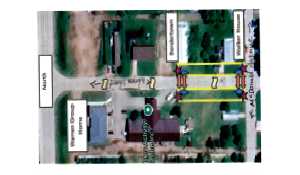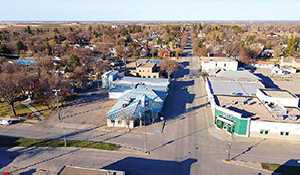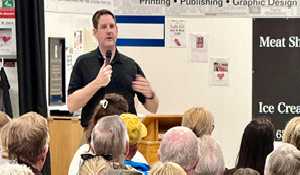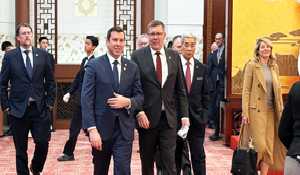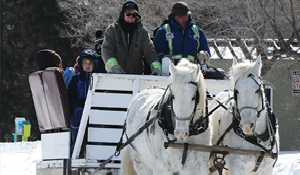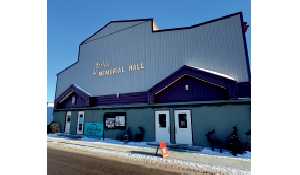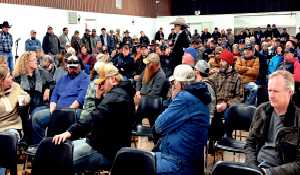And then there’s the stuff you just don’t know . . .
June 3, 2019, 12:55 pm

They say you know what you know, then there’s all that stuff that you know that you don’t know, like the intricacies of brain surgery, or why abbreviation is such a long word.
And then there’s all the stuff that you don’t even know that you don’t know, because you don’t know it even exists.
For a few days recently I disappeared from Moosomin to take part in an economics seminar put on by the Fraser Institute in Vancouver, and I found out there’s a lot about economics that I didn’t even have the foggiest notion that I didn’t know.
I figure I was selected to take part in this seminar based on the fact that I know absolutely nothing about economics, so I could benefit immensely. I mean look at me—I bought a small business—a newspaper at that—in rural Saskatchewan when most economic theories would say that’s not the smartest move.
I have never been the most financially savvy person. I remember years ago when I used to build websites myself, I built a website for a friend who sold Mac computers to people in the publishing and graphic arts industries, back when the only people who used Macs worked in the publishing and graphic arts industries. I built the website over a weekend, staying with him and his wife. I don’t remember the figures, but the negotiating on price went something like “How much would it take to get you to build a website for me?” “I don’t know. Let’s say $1,000.” “Nonsense, it’s a lot of work. Let’s say $2,000.” “No, that’s way too much, and you’re taking me in for the weekend while I build the website, let’s say $1,250.” And so on until we agreed on $1,500 coming at the negotiation from the opposite ends from what economic theory would tell you should have been, as in theory we should have been acting solely in our own economic self-interest. I don’t know if acting in your own economic self-interest actually is in your interest in the long run. In the media industry we have many companies that are solely focused on the bottom line and they cut the quality of their product until they close their business units one by one.
My experience in our little area has been that the most successful business owners and managers are those who are the most generous with their time and money.

I know many business owners, in creative industries like the media and also in every other types of small business, who are motivated more by passion than by the bottom line, and are doing well and growing their businesses.
In our case, we see this newspaper as a public service first, and a business second. We don’t limit our page count by the number of ads we sell, we expand the page count if there are more stories to tell. And we just had our best financial year ever in 2018, and our best May ever in May 2019, while Glacier, a company I have to assume is motivated by the bottom line, just closed a media property in Brandon it bought just a few years ago. I believe our success is a combination of our focus on community first, business second, our amazing staff, and a very supportive business community.
Anyway, I was invited to participate in this course and was happy to participate. I’ve always been curious about the finer points of economic theory like how Quantitative Easing by central banks actually works, and those things were well covered in the seminar, but I will still wonder to my dying day how exchange rates create such odd situations. I remember seeing Molson Export for sale at a bar on Boracay many years ago. I was drinking San Miguel—I was in the Philippines—but I was curious about the Molson Export, bottled in Canada and shipped overseas. When you converted the price in Philippine pesos to Canadian currency, a bottle of beer, brewed and bottled in Canada and shipped thousands of miles across the ocean and by tiny boat to a tiny island, was being sold for the equivalent of 50 cents Canadian normally, and 25 cents during happy hour. How does that make economic sense? (And most serious beer drinkers would argue that for Molson Export it was still overpriced.)
One thing economic theory tells us is that the money our economic system is based on is simply a concept, simply an agreed-upon means of valuing items. It’s not something real, it’s just a concept. But concepts can be powerful.
In one exercise, the 24 participants were given an asset and asked to value it, and the total value of the assets was calculated. Then participants were invited to trade with their neighbors, and the total value of the assets in the room increased a little bit. Then trade was opened up so that participants could trade freely with anyone in the room, and at the end of trading the total value of the assets had increased significantly, because they ended up with the people who valued them the most. It was a great way to learn the economic principle that free trade benefits all sides.
I learned for myself how powerful concepts can be when I reported from Vietnam a few years back. The collectivization of farms, through which all produce belonged to the government and farmers simply received a wage, led to malnutrition and an exodus of refugees fleeing malnutrition in Vietnam in the late 1970s, many of whom came to Canada.
Starting in 1981, farmers were permitted to sell their agricultural production after meeting state quotas, and production of rice and other crops immediately increased. In 1988, the government allowed farmers to lease land for up to 20 years, increasing production more as the farmers could make improvements to their land and benefit from them.
In 1993, the Land Law was passed, which gave landholders the rights of “exchange, transfer, inheritance, lease, and mortgage” of their leased land—in other words, they could improve the land and pass it on to their children.
From a food shortage so severe in the 1970s that people were starving and fleeing in rickety boats, rice production in Vietnam rose from 15,103,000 tonnes in 1987 to 32,554,000 tonnes in 2000. In 1989, Vietnam became a net exporter of rice and later became one of the largest rice exporters in the world and was adding more value, as rice paddies were converted to shrimp ponds, for instance, all because the concept of the stewardship of the land changed. No money changed hands, but the concept of how the land was to be valued and used changed, and a country went from famine to exporting food. Almost all the people I met in Vietnam had experienced hunger and seen the amazing economic growth when the government decided that, ideology or not, it had to change the way it was doing things.
As the seminar went on, and ever since, I have been thinking about how economic theory applied to what I learned and saw in the very different cultures with different economic systems I have been fortunate enough to visit as a reporter—Vietnam, the Philippines, Afghanistan, Pakistan, Hong Kong, and Azerbaijan, and how it applies in our little corner of the world, and how economic theory and reality may not always coincide.
It was a fascinating few days with a diverse group of very interesting people and some very accomplished economists, and I was honored to be part of it, but the main thing I learned is just how much I still have to learn . . . Tweet



